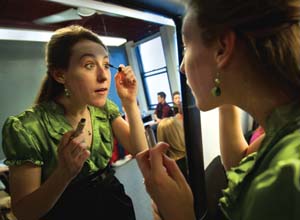 |
 |
| current issue |  | past issues |  | send a letter/news |  | address update |  | advertise |  | about us |  | alumni home |
Features
Broadway BoundPage: < Prev 1 2 3 4 Next >
By senior year, most theater majors know what it takes to be a pro. They have been performing since they were kids, and at UNH they are among the hardest working students on campus; besides taking courses, doing homework and, for some, holding down part-time jobs, they spend another 20-25 hours each week in rehearsals. They leave their dorms or apartments at 8 a.m. and don't return until midnight. "Last fall, my schedule started the day before classes began, and I didn't have a night off until Thanksgiving," Hadwen says. In fact, Loy says that hearing Broadway actors talk about their lives is heartening. "If you're in a show on Broadway, you work 35 hours a week, plus whatever professional development you do. It's nice to see that theater can be a job—in college, it's a life."

|
So at this point in their careers, being half-hearted isn't an issue for these kids. It's the nuts-and-bolts stuff that they need to hear from the agents. Like, what do you look for in a client? "Everyone is different," an agent explains. "Some agents want someone who is ready for Broadway. Others look for potential and want to work with someone they can help develop." Do you have any suggestions about interviewing techniques? "When I interview someone, I expect them to be able to rattle off a list of five shows that are running right now that they can see themselves in," an agent says. "I don't want to drive the interview. You need to have your story down." Another disagrees. "If somebody sits down in front of me and does a monologue, I get glassy-eyed. I like people to be relaxed—to have things to say that they want me to know, but communicate it in a natural way."
And finally, crucially, the students want to ask, what do you think of me? The agents think Coughlin's performance is top notch, but too, well, performance-y. Industry professionals will be more likely to see him in a variety of roles if his audition feels like "here's one of the many songs I sing exceedingly well," as opposed to "I was born to play this part." Also, they think his musical theater song is too musical theaterish. Because he has an edgy, urban "boy band" look, he should sing pop and rock songs; plus, the recent launch of Green Day's "American Idiot" on Broadway seems to be heralding another rock musical era. "You're going to do great," an agent says to him as he leaves the room.
Hadwen does a heroic job singing "The Beauty Is" from "The Light in the Piazza," and not just because she's sick. It's a sophisticated piece with complicated harmony, more art song than show tune—most people couldn't hum it, let alone sing it. The agents, though, say that the song is overdone in auditions. They also say she needs to improve her posture and get a better headshot. "You're much prettier than your photograph, and that's a problem," an agent says.
Thomas has a strong jaw, a wide smile, big eyes and a rich bass voice. The agents think his audition piece—"Make Them Hear You" from "Ragtime"—fell flat. It comes at a climactic moment in the show, and, as an anthem, needs to convey energy, passion and commitment, which is tough to build in eight bars—the point at which most industry people will stop you because they have heard enough.
 Allie Hadwen Special Skills Conversational Spanish, conversational American Sign Language, flute, basic piano, cartwheels, basic stage fencing. |
The agents agree that Loy's performance of "Look At Me" from "Violet" was dynamic, the best of the day. Loy is a "triple threat" in industry parlance—her acting, singing and dancing are all strong. She has had a lot of dance training, which means she has one fewer hurdle to overcome in auditions: she looks comfortable in her own skin. "But never wear character shoes to an audition," an agent admonishes her. "It's a common college mistake. Wear a pair of really hot heels. I know it seems nit-picky, but the level of the audition is so high that we can be nit-picky."
An actor's training is rife with paradox. It takes hours of rehearsal, exploring the nuances of every word and gesture in a song or scene, for it to be spontaneous on stage. It takes years of training to learn every inch of one's body, gain instant access to one's store of emotion and imagination and to play someone else effectively. It takes an extraordinary amount of energy to present an authentic moment of stillness on stage. Theater majors spend four years developing their craft, but they have only just begun.
Enter Kimberly Vaughn. "Our goal is to help casting people call us back!" she says to the roomful of attendees at her workshop. Vaughn specializes in preparing actors for Broadway auditions—she shows them how to make every word and gesture perfect and true. As Hadwen walks to the center of the room, her nose begins to drip. She retreats to the piano for a tissue. Vaughn tells her it's OK to say you're not feeling well. As she walks back to the center, Hadwen looks nervous. It's OK to be nervous, too, says Vaughn, but don't look nervous. She should look straight ahead as she walks, and release the tension in her arms. "Now introduce yourself."
"Um, my name is Allie Hadwen," she says. "And I'll be singing 'The Beauty Is' from 'Light in the Piazza.'" Vaughn says we're all human, and we all say "um"—but don't. Hadwen will be auditioning for producers who have to raise $15 million—they'll trust her talent if she takes command of the room. And they will probably know which show your song is from, Vaughn reminds her. Hadwen pauses before she starts to sing again—now the nervous energy is gone and she radiates confidence. The audience is at ease as a result. "That was so much better!" Vaughn says. "Wasn't she so much more appealing?!"
The audition process is an opportunity for actors to tell their story—the work lies in translating a story or lyric by channeling it through their own interior landscape. If actors can plug their own feelings and relationships into the lyrics and music, then the story begins to feel like it is happening right there on stage and that they're making it up as they go—therein lies the magic of theater.
Page: < Prev 1 2 3 4 Next >
Easy to print version

